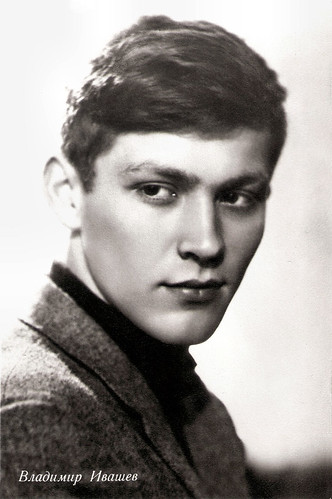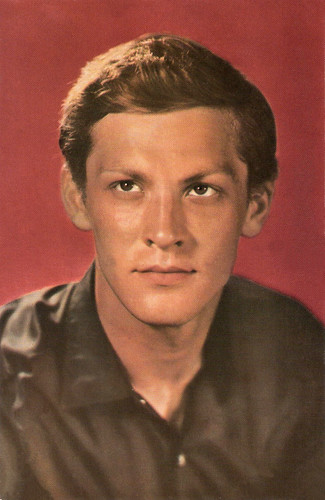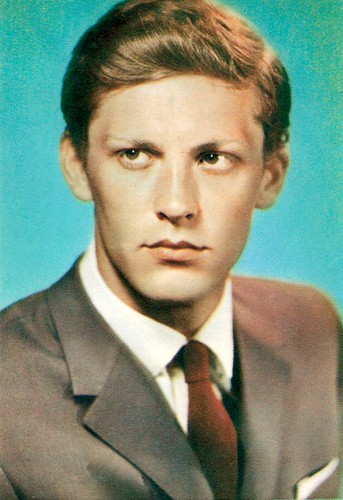Soviet actor Vladimir Ivashov (1939-1994) is best known for his film debut in Ballada o Soldate/Ballad of a Soldier (1960). Despite the worldwide acclaim for this film, and the respect he was offered by his peers for his later roles, stardom eluded him. At the end of his life he had to do hard labour at a railroad yard.

Russian postcard by Izdanije Byuro Propogandy Sovietskogo Kinoiskusstva, no. M 78052, 1962. Retail price: 8 kop.
Vladimir Sergeyevich Ivashov was born in Moscow, Soviet Union (now Russia) in 1939. At the age of 19, he was chosen for the lead role in Ballada o Soldate/Ballad of a Soldier (Grigori Chukhrai, 1960). At the time he was a first-year student under Mikhail Romm at Moscow's prestigious VGIK Institute.
Ballada o Soldate tells the relatively simple story of the young Russian soldier Alyosha (Ivashov) who gets a two-day vacation for shooting down several tanks during WW II. He hurries to his native village to see his mother and mend the roof of his house. On the way, he meets a pretty young girl (Zhanna Prokhorenko) and helps her get home. He also has some errands from his front fellows and spends precious time helping some other people. After all, he finally gets to see his mother for just a few precious moments before he is called back to the front. And he never comes home again.
The film was produced at Mosfilm and when it was released in the Soviet Union it sold 30.1 million tickets. The film received considerable praise for both its technical craft and its strong, yet subtle story. Viewed from the earnest, young protagonist, Ballad of a Soldier distanced itself from the fierce propaganda which bound other films before it.
American critics, particularly, hailed it as an instant classic, with the New York Times offering it iconic status. At AllMovie, Tom Wiener writes: "This is one of the least horrific war films ever made, which isn't to say that it glorifies combat or ignores suffering. It also contains one of the saddest expressions of motherly love ever spoken, when Alyosha's mother bids him farewell by crying out, 'I didn't wait for your father, but I'll wait for you.'"
It was in fact the first Russian film to score an American success during the Cold War era. It won also several awards, including the BAFTA Award for Best Film from any Source, the Special Jury Prize at the Cannes Film Festival of 1960, and was nominated for the Academy Award for Best Original Screenplay.

Russian postcard by Izdanije Byuro Propogandy Sovietskogo Kinoiskusstva, no. A 11251, 1966. Photo: B. Vilenkjna / Ter-Ovanesova. (This postcard was printed in an edition of 100.000 cards. The price was 8 kop.).
Vladimir Ivashov graduated from the VGIK Institute in 1963 and was deluged with film offers. He played subsequent film roles in Khokkeisty/The Hockeyplayers (Rafail Goldin, 1964), and Geroy nashego vremeni (Stanislav Rostotsky, 1965). Most were insignificant comedies and unknown in the West.
There were exceptions. In her 1995 obituary of Ivashov in The Independent, Jeanne Vronskaya writes: "But he left another memorable performance in the lead role of Pechorin, the film directed by Stanislav Rostotski (1967), based on Mikhail Lermontov's 'Hero of Our Time', in which he plays an aristocratic Russian officer desired by many high-society women." Also interesting is Nass wal Nil, al-/Those People of the Nile (Youssef Chahine, 1968).
During the 1970s he played roles in Korona Rossiyskoy imperii, ili snova neulovimye/Crown of Russian Empire, or the Elusives Again (Edmond Keosayan, 1971), A zori zdes tikhie/The Dawns Here Are Quiet (Stanislav Rostotsky, 1974), Kogda nastupaet sentyabr/When September Comes (Edmond Keosayan, 1975), Brillianty dlya diktatury proletariata/Diamonds for the Proletariat (Grigori Kromanov, 1975), and the ingenious Science Fiction film Test pilota Pirxa/Test Pilot Pirxa (Marek Piestrak, 1978).
Ivashov never repeated his early success. He was offered respect by his peers for his work, but the public had virtually forgotten him. His later films include Cherez Gobi i Khingan (Vasili Ordynsky, Badrahin Sumhu, 1981), Zhil-byl Pyotr/Once Upon A Time There Was Peter (Sergei Sychyov, 1983), Russkiye bratya/Russian Brothers (Nikolai Fomin, 1991), and Ubiystvo na Zhdanovskoy/The Murder at Zhdanovskaya (Sulambek Mavilov, 1992).
Towards the end of his life, he found it so difficult to find acting jobs that he worked in a railroad yard loading and unloading freight cars. According to his wife, actress Svetlana Svetlichnaya, Ivashov suffered from a weak heart and the labour-intensive railroad work was presumedly responsible for his early death at the age of 55.

Russian postcard by Izdanije Byuro Propogandy Sovietskogo Kinoiskusstva, no. A 11211, ca. 1964. Photo: Ter-Ovanesova. (This postcard was printed in an edition of 150.000 cards. The price was 8 kop.).
Sources: Jeanne Vronskaya (The Independent), Sandra Brennan (AllMovie - Page now defunct), Tom Wiener (AllMovie - Page now defunct), Wikipedia, and IMDb.
This post was last updated on 8 November 2024.

Russian postcard by Izdanije Byuro Propogandy Sovietskogo Kinoiskusstva, no. M 78052, 1962. Retail price: 8 kop.
30.1 million tickets
Vladimir Sergeyevich Ivashov was born in Moscow, Soviet Union (now Russia) in 1939. At the age of 19, he was chosen for the lead role in Ballada o Soldate/Ballad of a Soldier (Grigori Chukhrai, 1960). At the time he was a first-year student under Mikhail Romm at Moscow's prestigious VGIK Institute.
Ballada o Soldate tells the relatively simple story of the young Russian soldier Alyosha (Ivashov) who gets a two-day vacation for shooting down several tanks during WW II. He hurries to his native village to see his mother and mend the roof of his house. On the way, he meets a pretty young girl (Zhanna Prokhorenko) and helps her get home. He also has some errands from his front fellows and spends precious time helping some other people. After all, he finally gets to see his mother for just a few precious moments before he is called back to the front. And he never comes home again.
The film was produced at Mosfilm and when it was released in the Soviet Union it sold 30.1 million tickets. The film received considerable praise for both its technical craft and its strong, yet subtle story. Viewed from the earnest, young protagonist, Ballad of a Soldier distanced itself from the fierce propaganda which bound other films before it.
American critics, particularly, hailed it as an instant classic, with the New York Times offering it iconic status. At AllMovie, Tom Wiener writes: "This is one of the least horrific war films ever made, which isn't to say that it glorifies combat or ignores suffering. It also contains one of the saddest expressions of motherly love ever spoken, when Alyosha's mother bids him farewell by crying out, 'I didn't wait for your father, but I'll wait for you.'"
It was in fact the first Russian film to score an American success during the Cold War era. It won also several awards, including the BAFTA Award for Best Film from any Source, the Special Jury Prize at the Cannes Film Festival of 1960, and was nominated for the Academy Award for Best Original Screenplay.

Russian postcard by Izdanije Byuro Propogandy Sovietskogo Kinoiskusstva, no. A 11251, 1966. Photo: B. Vilenkjna / Ter-Ovanesova. (This postcard was printed in an edition of 100.000 cards. The price was 8 kop.).
Weak heart
Vladimir Ivashov graduated from the VGIK Institute in 1963 and was deluged with film offers. He played subsequent film roles in Khokkeisty/The Hockeyplayers (Rafail Goldin, 1964), and Geroy nashego vremeni (Stanislav Rostotsky, 1965). Most were insignificant comedies and unknown in the West.
There were exceptions. In her 1995 obituary of Ivashov in The Independent, Jeanne Vronskaya writes: "But he left another memorable performance in the lead role of Pechorin, the film directed by Stanislav Rostotski (1967), based on Mikhail Lermontov's 'Hero of Our Time', in which he plays an aristocratic Russian officer desired by many high-society women." Also interesting is Nass wal Nil, al-/Those People of the Nile (Youssef Chahine, 1968).
During the 1970s he played roles in Korona Rossiyskoy imperii, ili snova neulovimye/Crown of Russian Empire, or the Elusives Again (Edmond Keosayan, 1971), A zori zdes tikhie/The Dawns Here Are Quiet (Stanislav Rostotsky, 1974), Kogda nastupaet sentyabr/When September Comes (Edmond Keosayan, 1975), Brillianty dlya diktatury proletariata/Diamonds for the Proletariat (Grigori Kromanov, 1975), and the ingenious Science Fiction film Test pilota Pirxa/Test Pilot Pirxa (Marek Piestrak, 1978).
Ivashov never repeated his early success. He was offered respect by his peers for his work, but the public had virtually forgotten him. His later films include Cherez Gobi i Khingan (Vasili Ordynsky, Badrahin Sumhu, 1981), Zhil-byl Pyotr/Once Upon A Time There Was Peter (Sergei Sychyov, 1983), Russkiye bratya/Russian Brothers (Nikolai Fomin, 1991), and Ubiystvo na Zhdanovskoy/The Murder at Zhdanovskaya (Sulambek Mavilov, 1992).
Towards the end of his life, he found it so difficult to find acting jobs that he worked in a railroad yard loading and unloading freight cars. According to his wife, actress Svetlana Svetlichnaya, Ivashov suffered from a weak heart and the labour-intensive railroad work was presumedly responsible for his early death at the age of 55.

Russian postcard by Izdanije Byuro Propogandy Sovietskogo Kinoiskusstva, no. A 11211, ca. 1964. Photo: Ter-Ovanesova. (This postcard was printed in an edition of 150.000 cards. The price was 8 kop.).
Sources: Jeanne Vronskaya (The Independent), Sandra Brennan (AllMovie - Page now defunct), Tom Wiener (AllMovie - Page now defunct), Wikipedia, and IMDb.
This post was last updated on 8 November 2024.
No comments:
Post a Comment